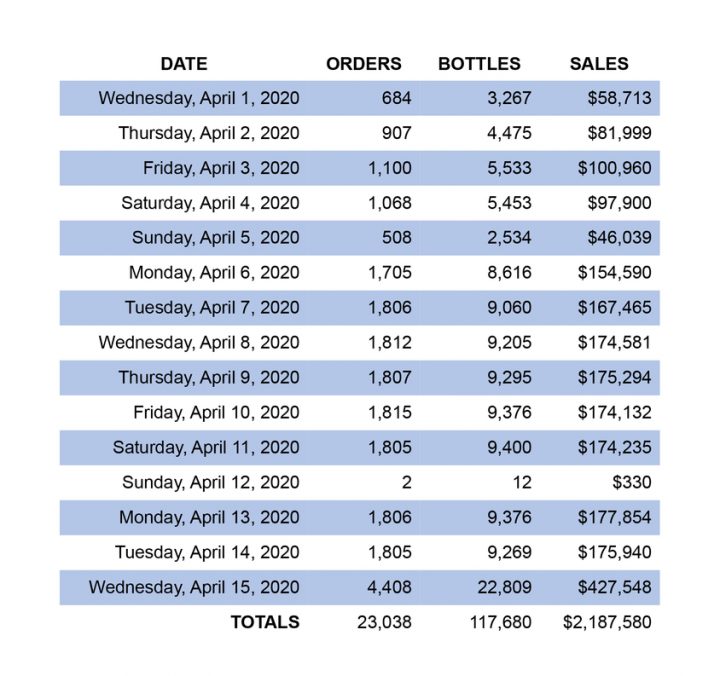
Wine and spirits sales in Pennsylvania have quickly gone from the best of times to the worst of times. Record sales of $131 million in the first 15 days of March came to a screeching halt when all 585 Fine Wine And Good Spirits wine and sprits stores—along with the Pennsylvania Liquor Control Board’s (PLCB) online sales platform—closed on March 18 in response to the Covid-19 pandemic.
Since the closures, many Pennsylvanians have crossed state borders to buy wine and spirits in neighboring states. “We are about four miles in from the Pennsylvania line,” says Bob Kreston, owner of Kreston Wine & Spirits in Wilmington and Middletown, Delaware. “With our reputation and the product selection and pricing we have always attracted Pennsylvania customers.”
Since mid-March, Kreston’s store in Wilmington has seen a 50% spike in business, and the Middletown store’s sales are up 30%. “When Pennsylvania shut down, there was a huge influx of additional customers coming from Pennsylvania because they had no choice,” he says. “For the first two or three weeks, it was a lot of people stocking up and buying because they were afraid Delaware liquor stores would shut down, too.”
Kreston’s Wilmington store started getting a lot of phone calls for products popular in Pennsylvania, such as Jacquin’s Royale vodka ($16 a 1.75-liter) and Nikolai vodka ($13). “It’s unusual that we sold out of those two brands in particular,” he says. Other big sellers at Kreston’s since mid-March include Tito’s vodka ($29 a 1.75-liter), Bacardi ($14), Dewar’s ($22 a 750-ml.), Bota Box ($19 a 3-liter box), Black Box ($19), and Franzia ($19 a 5-liter box).

In an effort to stop Covid-19 from spreading, Delaware Gov. John Carney issued an executive order—effective on March 30—to prevent non-essential out-of-state visitors from entering the state, which has no sales taxes. “The phone rings off the hook all day long with people from Pennsylvania asking if it’s okay to come here,” Kreston says. “We aren’t told we can’t serve them. I haven’t heard anything on our end as far as any of our customers having problems from the police.”
While retailers can’t ship or deliver beverage alcohol in Delaware, Kreston says curbside pickup is becoming popular. “We encourage people to do curbside pickup even though it does require more manpower because it reduces the number of people in the building,” Kreston says. “We do more and more everyday.”
In the Buffalo, New York metropolitan area, Pennsylvanians have made their presence known at Premier Wine & Spirits. “We have gotten some calls and we have some Pennsylvania customers coming up for purchases,” says Jon Notarius, wine director at Premier. “We’ll get some curbside order for five or six cases of wine and it’ll be a Pennsylvania address. There’s not a lot of those types of orders, but the people who do come from Pennsylvania are spending a few thousand dollars, so it’s something.”
Premier’s overall business has been up by double-digits since mid-March, Notarius says. The store is doing about 300 curbside sales and 150 FedEx orders a day, while average orders have increased from $65 to $100. “We’re still selling a lot of Cavit Pinot Grigio ($10 a 750-ml.) and Kendall-Jackson Reserve Chardonnay ($16),” Notarius says. “People are buying brands they’re familiar with, and they grab them quickly.”

The PLCB, meanwhile, decided to switch gears; on April 1, it opened up to limited online orders of spirits and wine, through Finewineandgoodspirits.com. Online services were initially overwhelmed and stalled, but are now running smoothly on a limited basis. While the PLCB’s online sales will eclipse last year’s high of $5 million, it pales in comparison to the PLCB’s estimated average daily retail sales of $5.55 million based on annual wine and spirits sales of $2.7 billion (including 25%, or $675 million to on-premise licensees) in 2019. Retail beverage alcohol sales in Pennsylvania were just over $2 billion last year. During the first 15 days of April, the PLCB’s limited online sales of wine and spirits were just $2.19 million. The PLCB also began limited curbside pickup orders—from 9 a.m.-1 p.m.—at 176 stores on Monday, April 20. Customers are limited to placing one order per day over the phone of up to six bottles of wines or spirits.
Even with Pennsylvania testing the waters, retailers expect Pennsylvanians to continue crossing state borders to buy beverage alcohol. “We’ve done our best to limit those numbers, but we’re sympathetic to those customers,” Kreston says. “I don’t think there is anybody right now that couldn’t use a drink at the end of the day.”